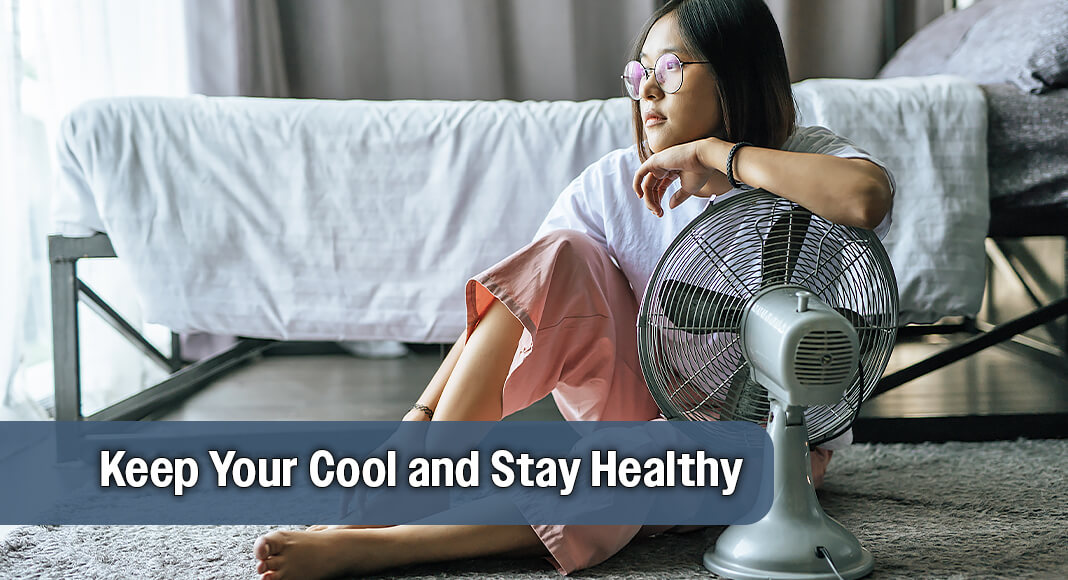
Texas Border Business
By American Heart Association
Here’s a hot tip for summer health: Pay attention to how warm your bedroom gets.
Keeping cool before and after you fall asleep is a much bigger deal than just kicking away the blanket, experts say. Sleep is crucial to health, and room temperature plays a “much more important” role in sleep than most people think, said Dr. Brooke Aggarwal, an associate professor of medical sciences at Columbia University Irving Medical Center in New York.
Room temperature is an important part of sleep hygiene – things that are necessary to optimize the sleep cycle, said Dr. Dayna Johnson, a sleep epidemiologist who is the Rollins Distinguished Associate Professor at Emory University in Atlanta.
And the health effects of poor sleep go beyond just feeling drowsy the next day, she said. Poor sleep can affect the ability to learn and has been linked to cardiovascular problems, including increased blood pressure.
Anyone who has tossed and turned in an overheated room understands the basics of how heat hurts sleep: If you’re too warm, it’s hard to both fall and stay asleep. But body temperature plays a role in sleep well before you turn down the covers and turn off the light.
Body temperature is usually highest in the early evening, around 6 or 7 p.m., said Aggarwal, a behavioral scientist and clinical health education specialist who studies sleep.
“As we start to prepare for sleep, the core body temperature starts to naturally drop,” she said. At the same time, a gland in your brain starts to secrete the hormone melatonin. “The melatonin, combined with the core body temperature lowering, helps us get into the mood for sleep.”
To lower its core temperature, the body pushes heat out through the skin. Blood flow in the hands and feet increases, allowing heat to be transferred into the surrounding air. A hot room makes it harder for our bodies to expel that heat. The problem can be worse for some groups, such as people who have a higher core temperature throughout the day, Aggarwal said, or menopausal women.
In addition to making it harder to fall asleep and thereby cutting down on the amount of sleep someone gets, heat can affect the quality of that sleep, Johnson said. Most adults need seven to nine hours of sleep a night, according to the American Heart Association.
Healthy sleep cycles through stages throughout the night. If you’re waking up because of the temperature, Johnson said, you would get less of the deeper phases, which affect memory, healing and feeling rested the next day. It also has been linked to an increased risk of high blood pressure and other cardiovascular issues.
Heat also tends to overlap with other things that affect air quality, such as humidity and air pollution, Johnson said. Humidity can exacerbate the effects of heat; air pollution is associated with obstructive sleep apnea, which interferes with breathing, raising the risk of cardiovascular problems.
Recommendations vary on just how cool your bedroom should be. The National Sleep Foundation says the ideal temperature for sleeping is 60 to 67 degrees Fahrenheit. Aggarwal suggests a slightly cooler range, 60 to 65 degrees, based on her interactions with study participants.
A study of older adults, published in 2023 in Science of the Total Environment, suggested that sleep was most restful when the nighttime temperature ranged from 68 to 77 degrees. Sleep efficiency dropped 5% to 10% when the temperature increased from 77 to 86.
Johnson said the ideal temperature will vary based on life stage and body size. What’s comfortable for a woman during menopause, for example, may not be the same for someone else. “It’s better to think about what is comfortable for you” than to target a specific number, she said.
But clearly, “if you are in a hot environment, having air conditioning is ideal,” Aggarwal said. But that’s not the only answer. Opening a window might help – if the noise outside allows – and “if you have a fan, that also really helps to circulate the air.”
Other cooling ideas include:
Take a warm bath: It seems counterintuitive, Aggarwal acknowledged, but studies have shown the benefits of taking a warm bath about two hours before bedtime. Warm water helps increase blood circulation, which helps draw heat from your body’s core.
Use shades during the day: Blocking sunlight can help keep heat out during the day, Johnson said. Shades also are helpful for blocking sleep-disrupting light pollution at night. Just be sure to get some exposure to sunlight so your circadian rhythms aren’t thrown off, she said. Seeing bright light in the morning can actually help you sleep at night.
Avoid exercising right before bedtime: Work out earlier in the day, Aggarwal said. Research has shown that exercise close to bedtime can interfere with sleep.
Choose the right bedding materials: Synthetic foam mattresses can trap heat, Aggarwal said, so she recommends mattresses with natural materials. Some mattresses also have technology that promotes cooling. Use light blankets and wear light clothing at night.
Both Johnson and Aggarwal said newer technologies for cooling packs or pillows look promising, although research has not fully examined how well they work.
Aggarwal also has an answer for couples who might argue over what constitutes a comfortable temperature setting, although only half of them will like her answer.
“Really,” she said, “whoever wants it cooler is probably right.”








